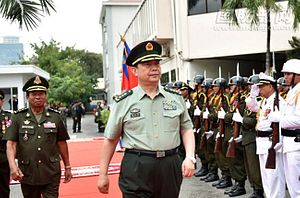Chinese and Cambodian troops will hold a major eight-day joint exercise next month in what some are billing a huge boost for their defense relationship.
The exercise, called Golden Dragon, will reportedly take place at the Thlok Tasek Military Institute in Kampong Speu province from December 15 to 23. It will feature more than 500 soldiers and focus on fields like emergency road repairs and construction, natural disaster medical treatment, landmine detection and destruction, dam building and flood relief.
Details of the exercise were unveiled as General Wang Jiaocheng of the Chinese People’s Liberation Army (PLA) visited Cambodia. The exercise was discussed generally as part of Wang’s meetings with Cambodian officials including Defense Minister Tea Banh and Royal Cambodian Armed Forces (RCAF) commander-in-chief General Pol Saroeun.
Following Wang’s meetings with Banh, Cambodia’s defense ministry said in a statement that the two sides would engage in exercises in December to share expertise, but no details were disclosed.
Cambodian newspaper Khmer Times cited military officials as saying that the exercise would be the “first such operation of its kind in Cambodia,” though few additional specifics were provided.
The exercise is just the latest in a series of steps that China and Cambodia have taken to boost their military relationship. China has long had a strong defense relationship with Cambodia, one of Beijing’s key partners in Southeast Asia. China is the largest donor of military aid to Cambodia, and defense ties have been strengthening over the past few years (See: “Why is a Big Cambodia Military Delegation in China?”).
In February this year, Cambodia had held what was billed as the first-ever naval training exercise with China in a notable boost for their deepening defense relationship (See: “China, Cambodia Hold First Naval Exercise Amid South China Sea Fears”). Cambodia’s deputy navy chief Vice Admiral Van Bunneang called it the first and biggest-ever naval training exercise with Beijing, covering rescue activities as well as emergencies at sea.
































